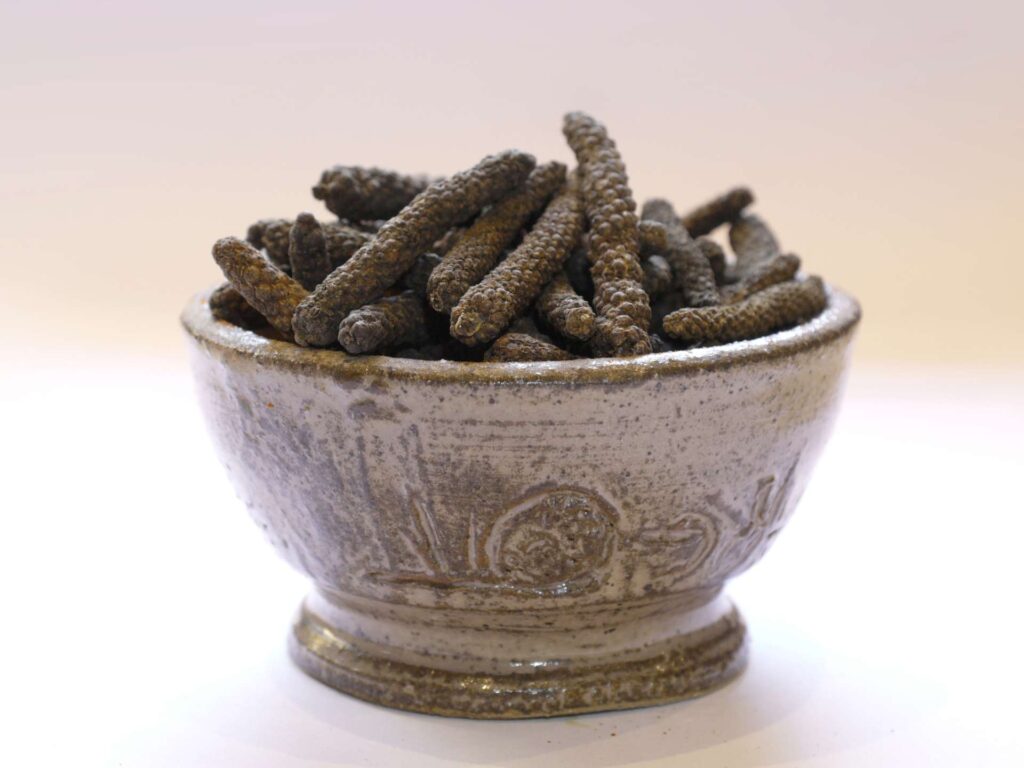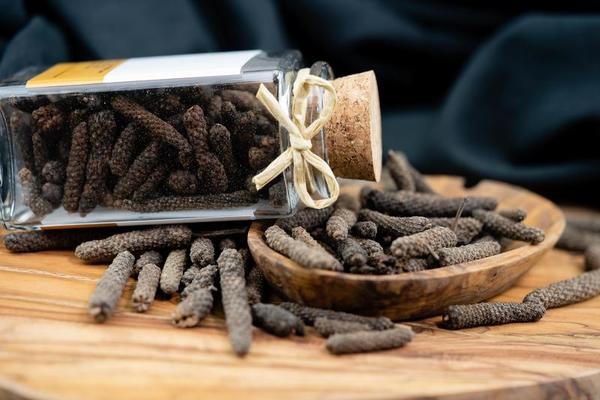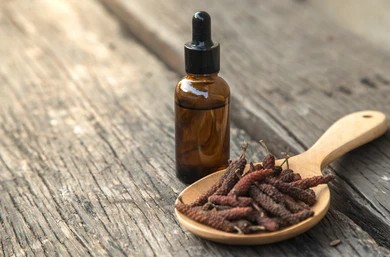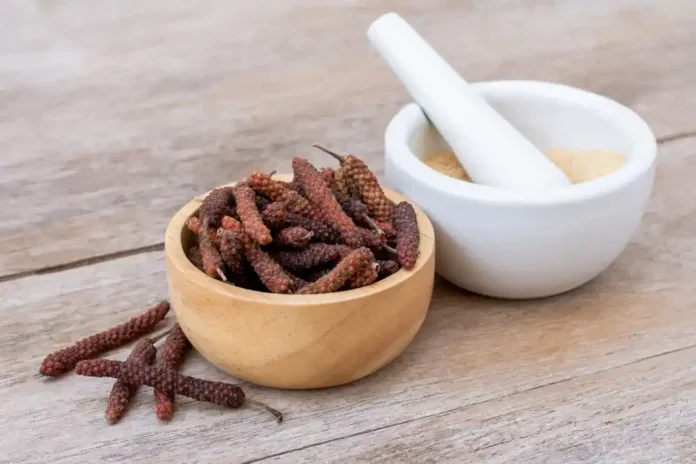INTRODUCTION:
Long pepper (Piper longum) is a spice closely related to black pepper, native to Southeast Asia. Known for its elongated shape and distinct, more complex flavor profile, it combines a mild heat with hints of sweetness and earthiness. Historically, long pepper was highly prized in ancient times and was used both for culinary and medicinal purposes. Its rich, aromatic flavor makes it a unique addition to various dishes, particularly in Indian and Southeast Asian cuisines.

English – Long Pepper
Hindi – Pipli (पिपली)
Tamil – Thippili (திப்பிலி)
Telugu – Thippli (తిప్పిలి)
Malayalam – Thippali (തിപ്പളി)
Bengali – Pipli (পিপলি)
Arabic – فلفل طويل (Filfil Tawil)
Urdu – طویل مرچ (Taweel Mirch) / پپلی (Pipli)
HEALTH BENEFITS

Rich in Antioxidants
Long pepper contains compounds like piperine, flavonoids, and alkaloids, which have strong antioxidant properties. These compounds help neutralize free radicals in the body, reducing oxidative stress and potentially lowering the risk of chronic diseases like heart disease, cancer, and premature aging.
Boosts Digestive Health
Long pepper is known to stimulate the digestive enzymes and improve overall digestion. It can help in treating indigestion, bloating, and other gastrointestinal issues. It’s also used as a remedy for relieving flatulence and constipation.
Anti-inflammatory Properties
The bioactive compounds in long pepper, especially piperine, have been shown to possess anti-inflammatory effects. This can help reduce inflammation in the body, potentially alleviating conditions like arthritis and inflammatory bowel diseases (IBD).
Aids in Respiratory Health
Long pepper is often used to treat respiratory conditions like asthma, coughs, and bronchitis. Its expectorant properties help clear mucus from the airways, improving breathing and reducing coughing.

Enhances Metabolism and Weight Loss
Some studies suggest that long pepper may boost metabolism, promoting fat breakdown and helping with weight loss. The piperine in long pepper also plays a role in increasing the bioavailability of other nutrients, making it easier for the body to absorb essential vitamins and minerals.
Improves Blood Circulation
The spice is known to stimulate blood flow, which may help in improving overall circulation. This can enhance oxygen and nutrient delivery to various tissues and organs, improving energy levels and physical performance.
Antimicrobial and Antifungal Properties
Long pepper has natural antimicrobial properties, making it effective in fighting off bacterial and fungal infections. It can help in treating skin infections, fungal outbreaks, and other microbial imbalances.
Boosts Immune System
Regular consumption of long pepper is believed to strengthen the immune system, helping the body fight off infections and illnesses. Its antibacterial and antiviral properties also contribute to this benefit.
Supports Cognitive Health
Piperine in long pepper may improve brain function by increasing the production of neurotransmitters like serotonin and dopamine. This can potentially help in boosting memory, focus, and mood regulation.
Supports Urinary Health
Long pepper is thought to promote healthy kidney function and treat urinary tract infections (UTIs). It has diuretic properties that increase urine output, helping to flush out toxins from the body.
SIDE EFFECTS:

Upset Stomach:
High doses of Piper longum can lead to stomach discomfort. Symptoms may include nausea, bloating, and cramps.
Hepatotoxicity:
Long-term or excessive use of Piper longum can lead to liver damage. It’s important to use this spice in moderation and consult a healthcare provider if you plan to use it regularly.
Hypertension:
Piper longum can potentially raise blood pressure. Individuals with preexisting hypertension or those on blood pressure medication should be cautious and seek medical advice before use.
Risks During Pregnancy:
Pregnant women are advised to avoid Piper longum as it may induce contractions or affect fetal development.
Breastfeeding: There is limited information on the safety of Piper longum during breastfeeding. It’s best to consult with a healthcare provider before use
HOW TO USE:
1. Powdered Long Pepper in Cooking
Spice for Curries and Soups: You can use long pepper powder in place of or alongside black pepper in curries, soups, or stews. Start with a small amount, as it has a stronger, more intense flavor than black pepper.
Rice Dishes: Add a pinch of long pepper powder to rice dishes like pilafs or biryanis for an extra layer of flavor.
Marinades: Mix long pepper powder with olive oil, vinegar, and spices to create a marinade for meat, chicken, or vegetables.
Baked Goods: For a unique twist, you can add powdered long pepper to baked goods like cakes, muffins, or cookies for a subtle spicy warmth.
2. Long Pepper Tea
Brewing Tea:
Take 1-2 whole long pepper berries or ½ teaspoon of powdered long pepper.
Boil in water for about 10 minutes.
Strain and drink while warm. You can add honey or lemon for taste.
For Cold and Cough Relief: If you’re using long pepper tea to relieve respiratory symptoms, try adding ginger, honey, and a pinch of turmeric to enhance the benefits.
3. Long Pepper Infused Oil

Infused Oil for Cooking: You can infuse olive oil or coconut oil with long pepper to make a spicy oil for drizzling over dishes, using in dressings, or for sautéing.
Heat the oil gently in a pan with whole long pepper for about 10 minutes, then strain and store the oil in a glass bottle.
4. Long Pepper in Smoothies
Spicy Smoothie Kick: Add a small pinch of powdered long pepper to fruit or vegetable smoothies. It pairs well with ingredients like mango, pineapple, spinach, and ginger.
5. Long Pepper in Soups or Broths
You can add whole long pepper berries directly to soups or broths to infuse the liquid with its spiciness. Just remember to remove the berries before serving.
Tips for Usage:
Start Small: Long pepper is quite potent, so start with a small quantity to see how your body reactsespecially if you’re using it medicinally.
Grind Fresh: If you’re using whole long pepper berries, it’s best to grind them fresh to preserve their flavor and potency.
Pair with Complementary Spices: Long pepper pairs well with other spices like cumin, coriander, turmeric, ginger, and cinnamon.
This Article is for Basic Information. Contact a professional doctor before using it.
HAKEEM KARAMAT ULLAH




